Why people think the system is broken in the U.S. and around the world
KEY FINDINGS:
- Countries like Romania, Turkey and Thailand are places where people are more likely to feel their system is broken.
- People in countries such as Sweden, Germany and the Netherlands are least likely to feel that their system is broken.
- The United States ranks just above the world average, around the middle of the pack among the 28 countries measured.
The system is broken—that’s what many people in the U.S. and around the world think and feel when they look out at their social, political and economic systems.
Building off these pervasive attitudes, recently anti-system candidates strung together many political wins. Trump’s presidential win in 2016 and Brexit in 2015 turned heads. From there, anti-establishment victories continued in places like Mexico, Brazil, France, Poland and Hungary, to name a few. These political movements cut across party lines—with candidates emerging on the right and left.
Ipsos runs a Global System Is Broken Index to measure this phenomenon, and after running this tracker for six years, we’ve found that elections help take the edge off some of the more hard-line anti-system beliefs.
But that doesn’t mean they just disappear. Concerns about election legitimacy and trust in the election process may still be compromised. Recent attacks on government buildings in the U.S. and Brazil, by people who don’t trust that their candidate lost legitimately, demonstrate the limits to what elections can do in places where trust with the public is broken.
Here are some of the most important takeaways to understand when navigating this anti-system moment:
- The belief that the system is broken is not a fringe idea
- Corruption and other forms of social disorganization feed broken-system beliefs
- Despite a turbulent few years, global broken-system attitudes softened since 2016
- Elections act as a pressure valve for populist attitudes
- Elite behavior influences trust in elections
1. The belief that the system is broken is not a fringe idea
Many people around the world feel their country’s system is broken. Many agree that their country’s economy is rigged to advantage the rich, that traditional parties and politicians don’t care about them, and that experts don’t understand their lives.
Undergirding this belief that the system is broken is a belief that the government, politics and the economy are not fair. Countries like Romania, Turkey and Thailand are places where people are more likely to feel their system is broken. On the other hand, people in countries such as Sweden, Germany and the Netherlands are least likely to feel that their system is broken. The United States ranks just above the world average, around the middle of the pack among the 28 countries measured.
These feelings are pervasive worldwide on both the left and right. In the past few years, populist leaders gained power including Italy’s Giorgia Meloni, Brazil’s Jair Bolsonaro, and the U.S.’s Bernie Sanders and Donald Trump.
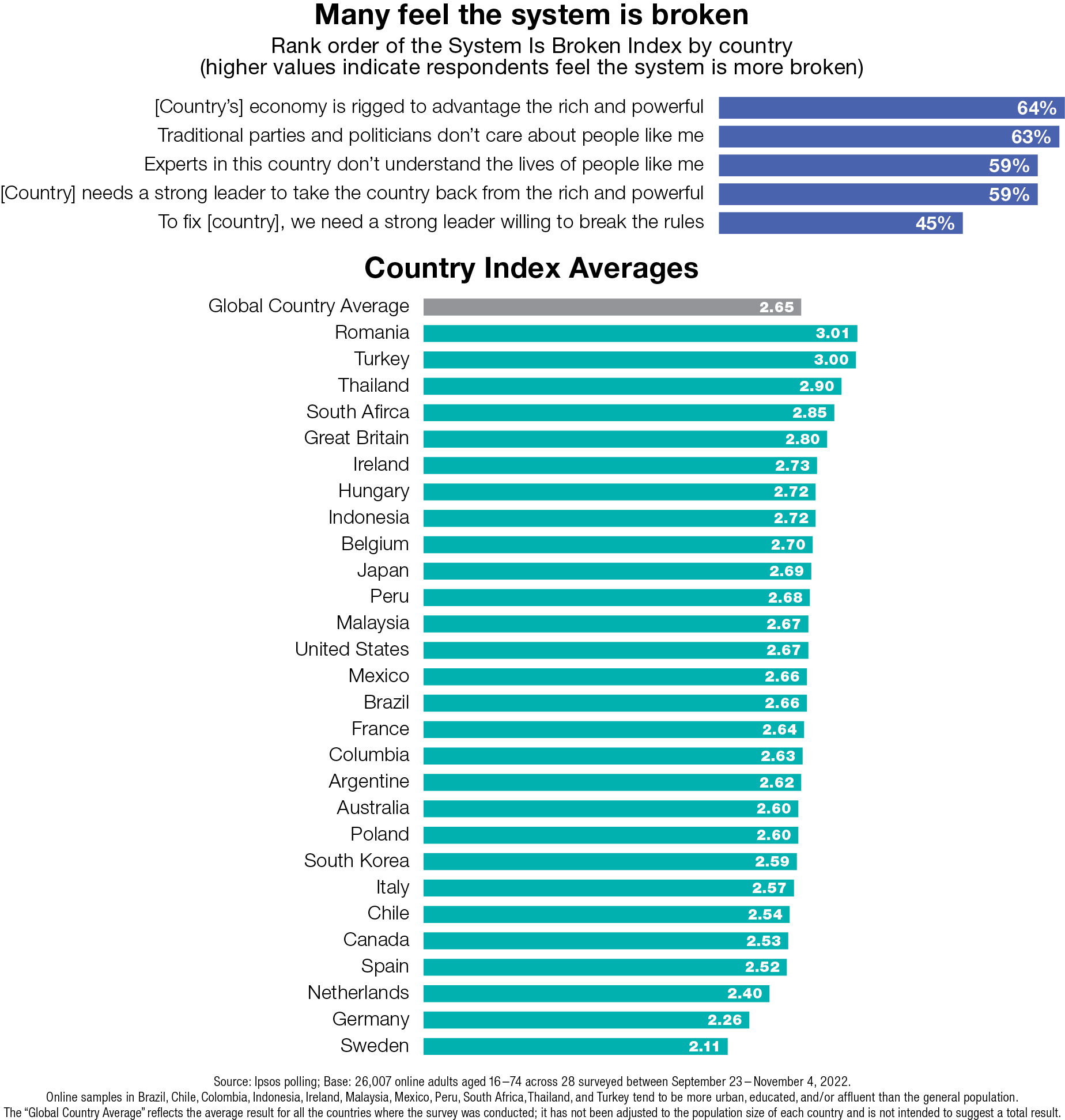
2. Corruption and other forms of social disorganization feed broken-system beliefs
A lack of trust precedes this belief that a country’s system is broken. But what leads to a lack of trust from the public? Corruption and other forms of social disorganization.
For example, countries where the public feels their leaders are corrupt also tend to register high on the System Is Broken Index. For many people in places where “system is broken” sentiment is high, “elites,” “experts,” and “politicians,” who often are believed to exacerbate and contribute to corruption, are not trusted by the public. How do people react? By looking to outsiders, people with a populist bent, to address the problems they feel their country is facing.
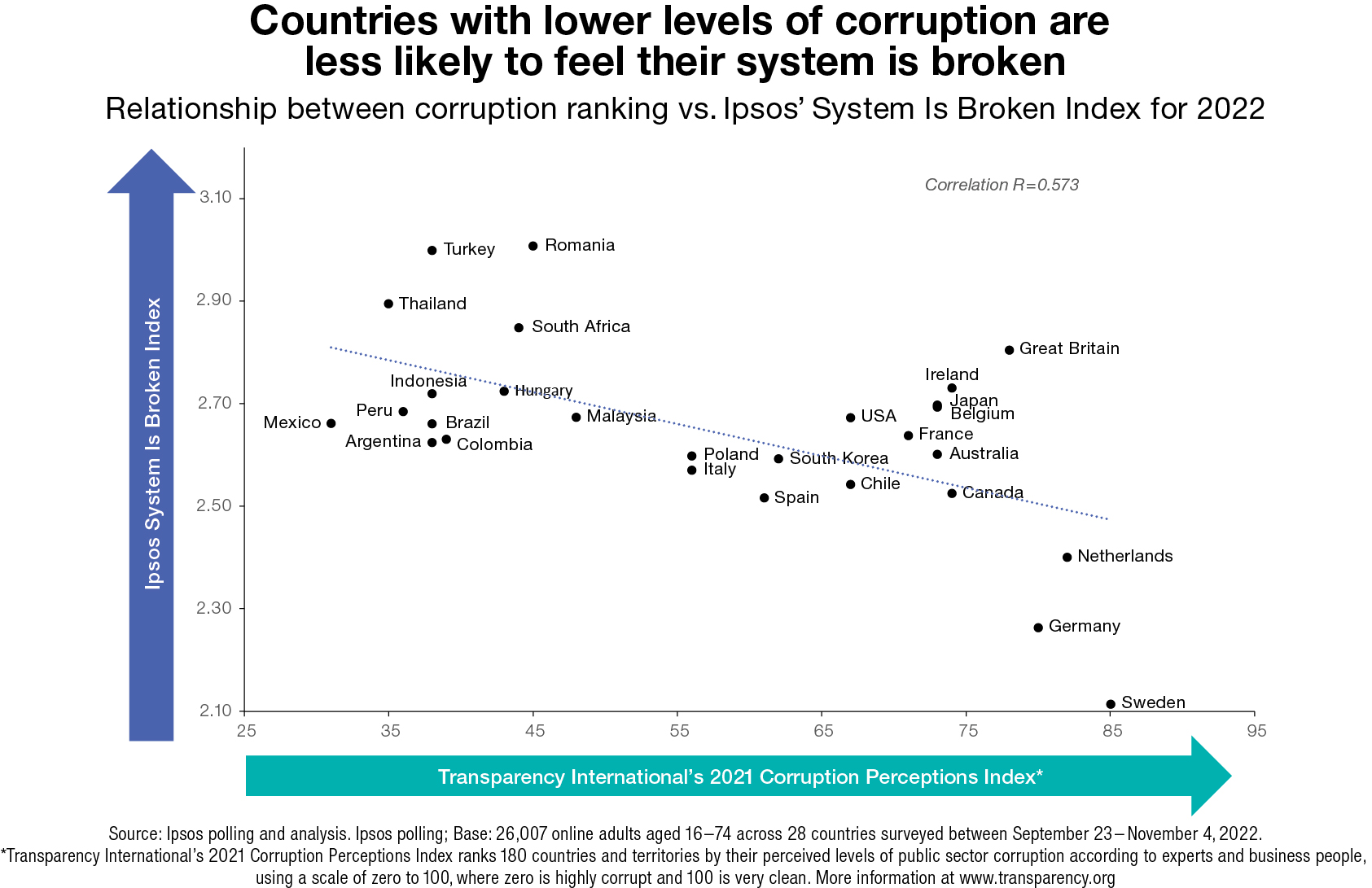
3. Despite a turbulent few years, global broken-system attitudes softened since 2016
Since 2016, when Ipsos began tracking broken-system sentiment, the world has gone through a pandemic, war in Europe, generationally high inflation, political turmoil and a cooling of international relations. Yet, amid all these changes worldwide, the System Is Broken Index has softened over the past six years.
Latin America has seen the steepest decline in “system is broken” sentiment. After a brief bump in 2021, Asia-Pacific is back to levels of broken-system sentiment it was experiencing in 2016. Where is this drop coming from?
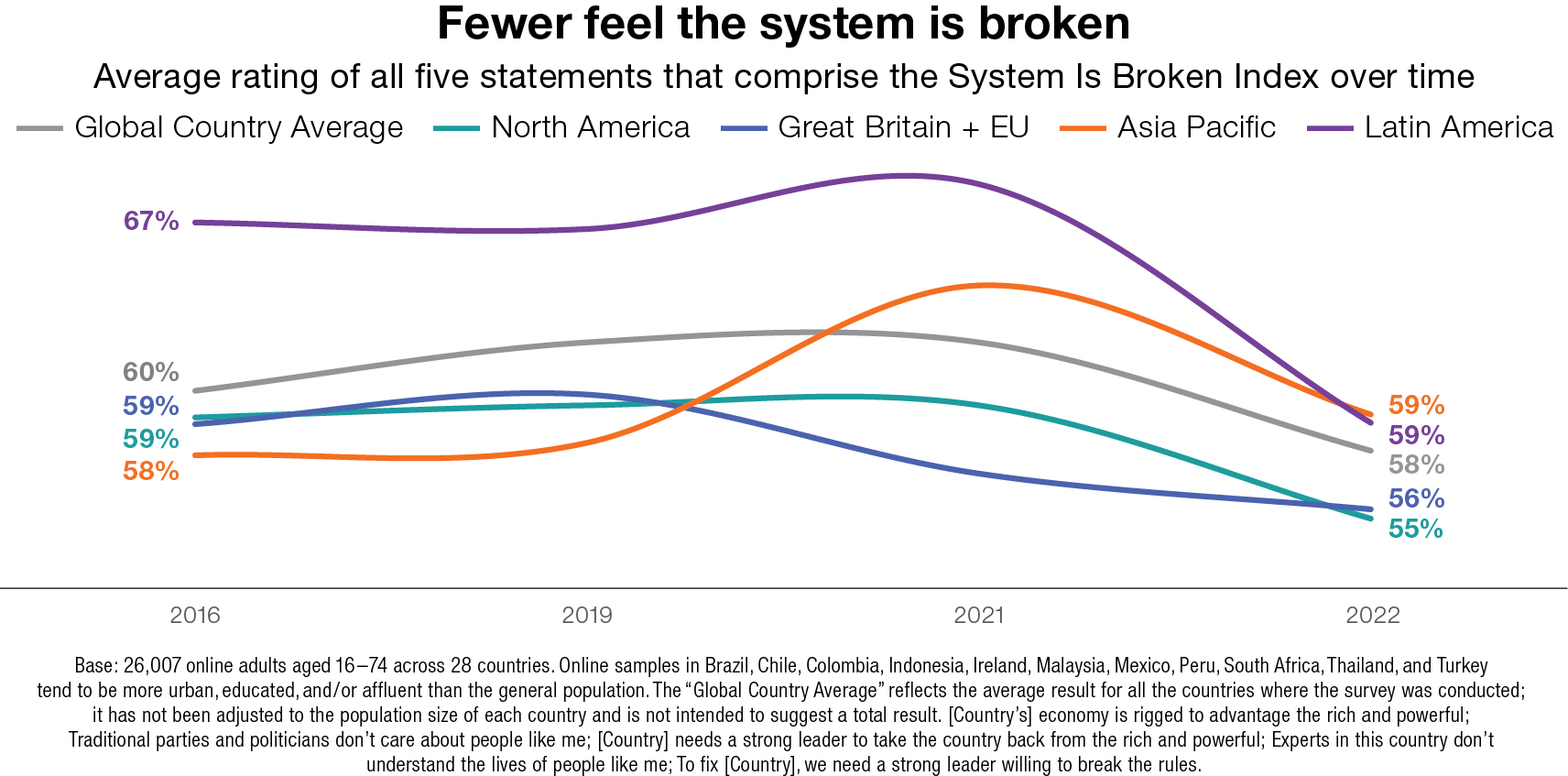
4. Elections act as a pressure valve for populist attitudes
An Ipsos analysis indicates that elections may be one avenue of alleviating the belief that the system is broken. Looking at the entire time series, in countries where a national election occurred, the System Is Broken Index on average dropped slightly. On the other hand, in countries that didn’t have a national election, the System Is Broken Index, on average, slightly rose.
That doesn’t mean elections are the end-all cure for disillusionment with the system. Despite being correlated to modest drops in “system is broken” sentiment, most globally still feel the system is broken. Still, these results suggest that democracy may act as a salve to populist sentiments.
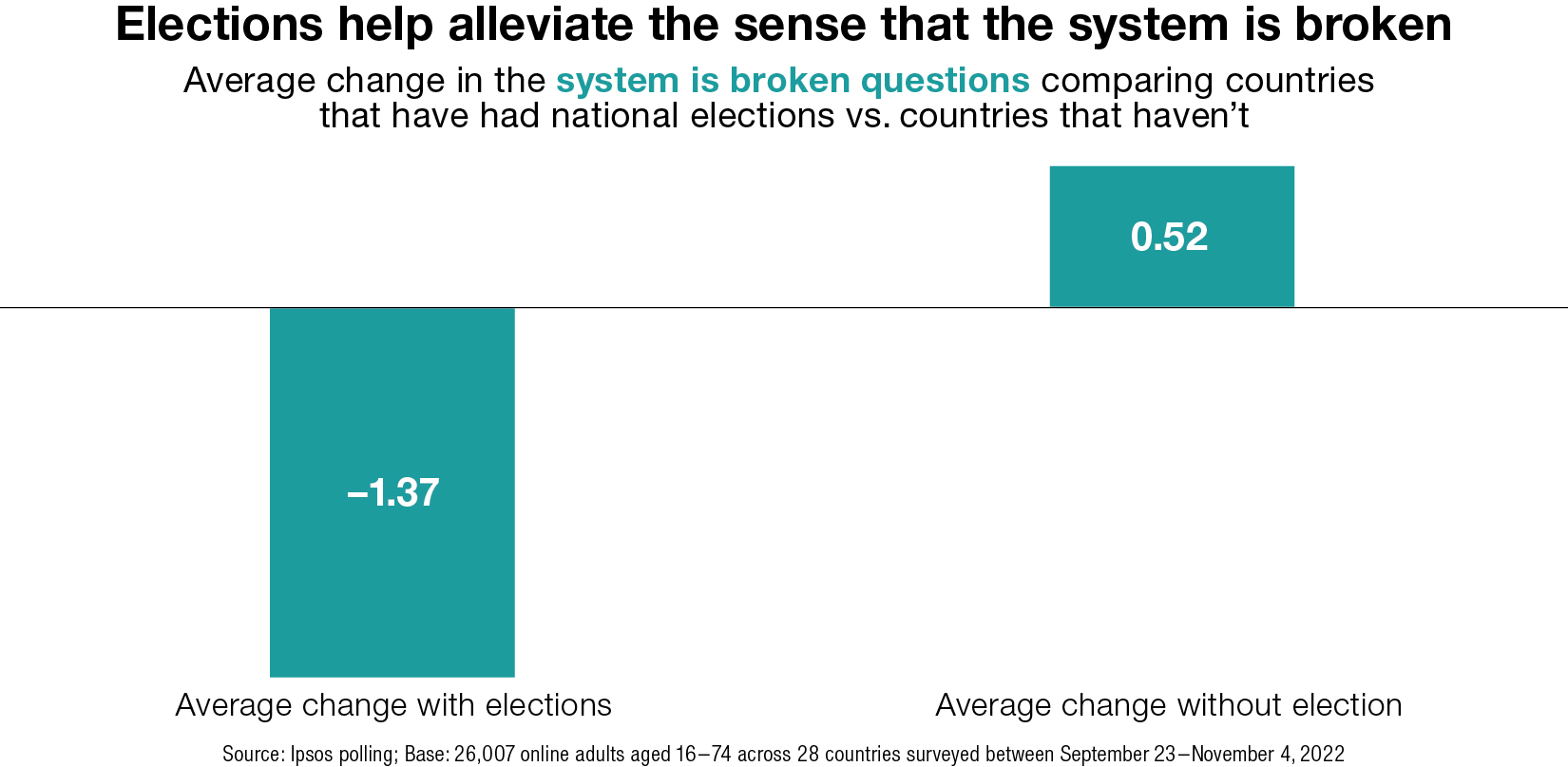
5. Elite behavior influences trust in elections
Elections are not, by themselves, a solution. The actions of major players, like politicians and government officials, impact whether the public trusts elections. Remember, a lack of trust in political and economic systems fuels the broken-system sentiment.
The two most recent elections in the United States offer examples of how the actions and words of politicians can influence the public’s trust in elections. In 2020, the losing candidate, Donald Trump, spent months denigrating the election process both in the lead-up to Election Day and after he lost. Google searches for “rigged election,” a go-to phrase for the former president, spiked right before Election Day and the insurrection at the Capitol on January 6th, 2021.
By and large, prominent elected officials did not question election legitimacy before 2020. Relative to 2020 searches, virtually no one was looking up “rigged election” before.
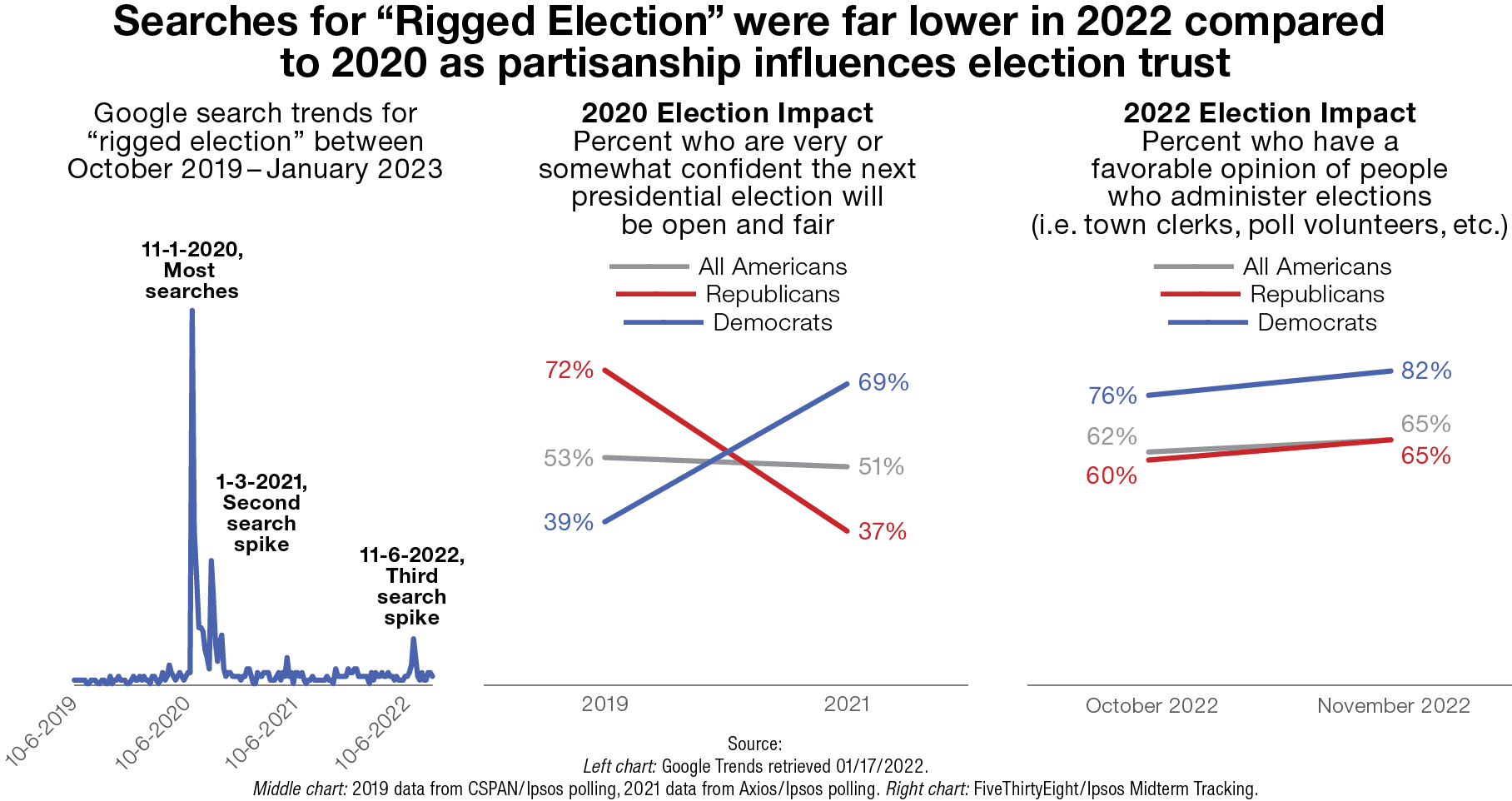
The cues people receive from their elected officials influence the views they hold. Outside of Google searches, Trump’s own tweets questioning the legitimacy of the election grew in 2020, mirroring the Google trend patterns. Relatedly, compared to 2019, trust in the election process declined sharply, particularly among Republicans, Trump’s party. At the same time, the Democrats, the winning party, gained trust in the election process.
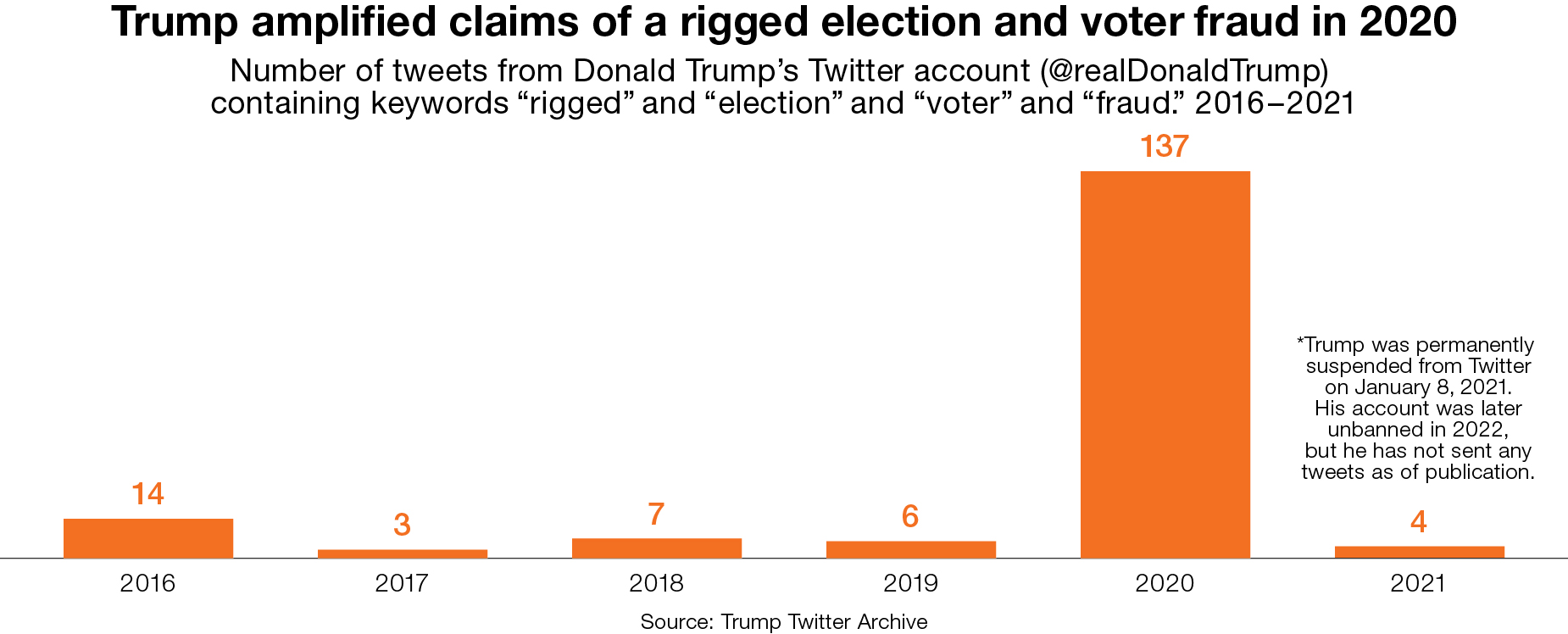
Compare these dynamics to the 2022 election cycle, where Republicans again underperformed expectations. In the lead-up to this election, many still were concerned that the election would be rigged, with particularly elevated levels of concern from Republicans. However, few candidates who ran on election denial platforms ended up contesting the results of their races. All conceded, in line with public attitudes. Relatedly, trust in election officials remained high and stable in the lead up to the midterms and after.
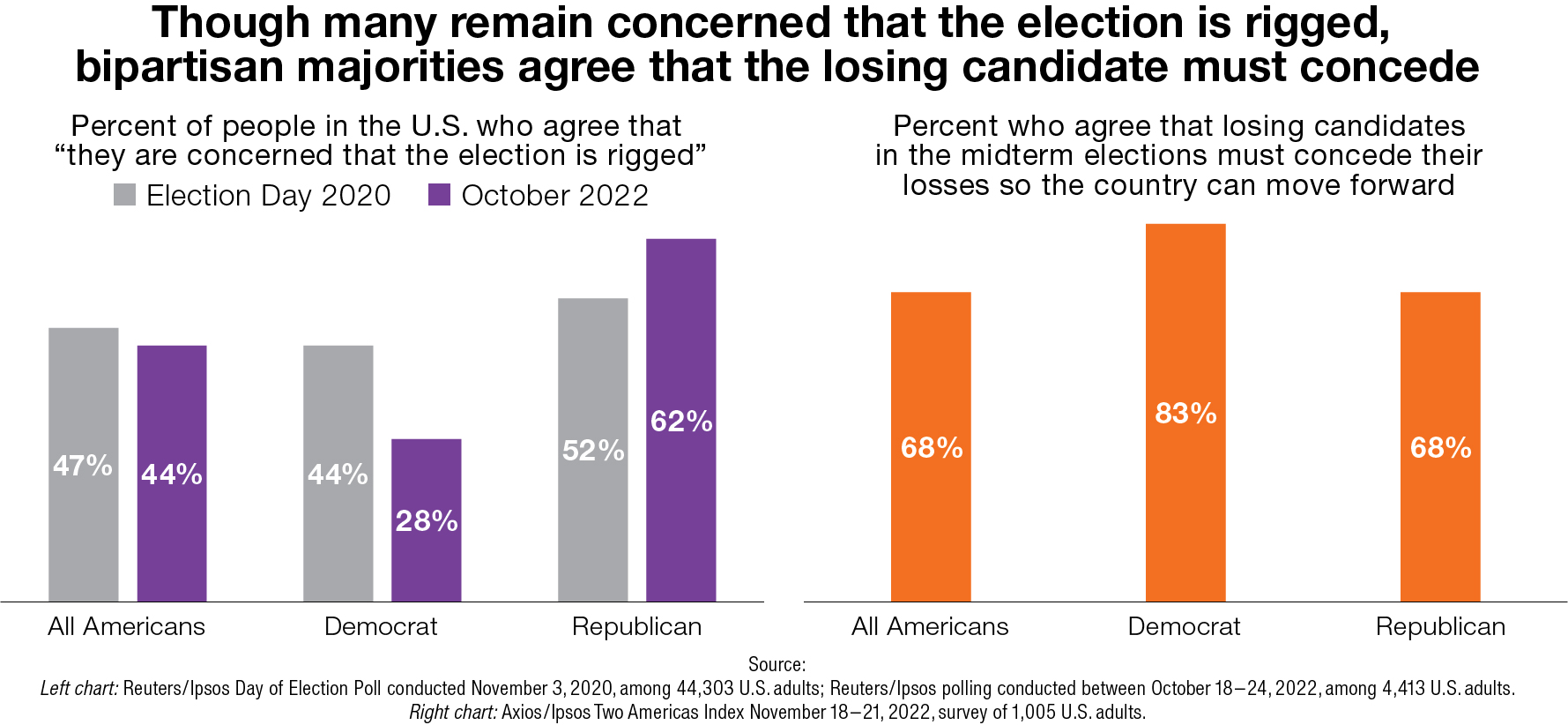
But concessions can’t stand in the place of confidence. Even as many want to see the country move forward, many still believe that the system is broken. Heading into the next presidential cycle, the lingering lack of trust in U.S. election systems from 2020 creates the potential for issues should influential actors behave irresponsibly. Based on how candidates react to losses and prime their supporters, 2020 and 2022 demonstrated how elections can both provide a remedy to the broken-system belief and fuel these sentiments.


![[WEBINAR] How to build trust in the AI era](/sites/default/files/styles/list_item_image/public/ct/publication/2026-02/thumbnail-trust-ai_0.jpg?itok=n6Xc78CU)
![[WEBINAR] Know America at 250: Public Opinion Update](/sites/default/files/styles/list_item_image/public/ct/news_and_polls/2026-02/250_0.png?itok=UwPuoNWi)